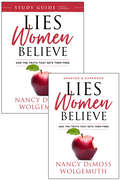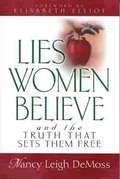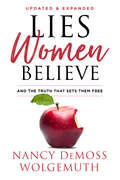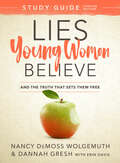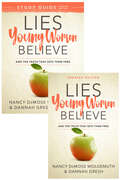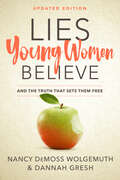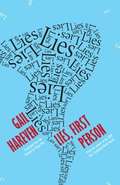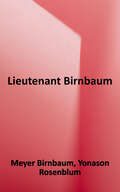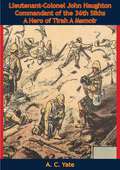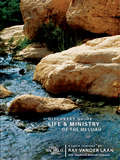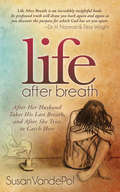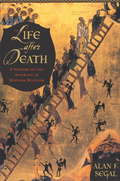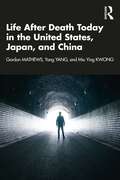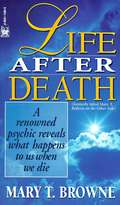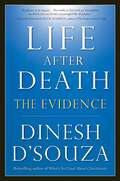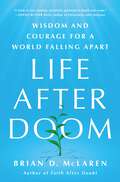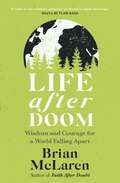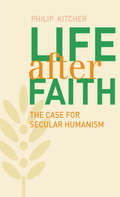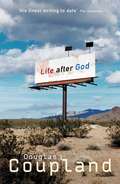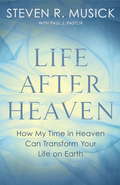- Table View
- List View
Lies Women Believe/Lies Women Believe Study Guide- 2 book set: And The Truth That Sets Them Free
by Nancy DeMoss WolgemuthThis 2-book set includes bestselling Lies Women Believe and Lies Women Believe Study Guide.In this bestseller book, Lies Women Believe, Nancy exposes those areas of deception most commonly believed by Christian women—lies about God, sin, priorities, marriage and family, emotions, and more. She then sheds light on how we can be delivered from bondage and set free to walk in God's grace, forgiveness, and abundant life. Nancy offers the most effective weapon to counter and overcome Satan's deceptions: God's truth!In Lies Women Believe Study Guide, you will go deeper with the truths of Lies Women Believe. This engaging workbookis made up of ten sessions and is designed for individuals and small groups. You will get an overview of the chapter to be studied from Lies Women Believe, a daily personal study for you to complete during the course of the week between your small group meetings, as well as questions to answer under the subtitles "Realize," "Reflect," and "Respond."
Lies Women Believe: And the Truth that Sets Them Free
by Elisabeth Elliot Nancy Leigh DemossBack Cover: “We are like Eve. We have all experienced defeats and failures, trouble and turmoil. We have all experienced a selfish heart, a shrewish spirit, anger, envy, and bitterness. And we ache to do things over, to have lives of harmony and peace. In her book, Lies Women Believe, author Nancy Leigh DeMoss exposes those areas of deception most commonly believed by Christian women: * LIES ABOUT THEMSELVES: I should not have to live with unfulfilled longings. * LIES ABOUT SIN: I cannot walk in consistent victory over sin. * LIES ABOUT THEIR MARRIAGE: If I submit to my husband, I will be miserable. * LIES ABOUT THEIR EMOTIONS: I can't control my emotions. * LIES ABOUT THEIR CIRCUMSTANCES: I just can't take any more. Nancy Leigh DeMoss sheds light on how we can be delivered from bondage and set free to walk in God's grace, forgiveness, and abundant life. This book offers the most effective weapon to counter and overcome Satan's deceptions--God's truth.”
Lies Women Believe: And the Truth that Sets Them Free
by Nancy DeMoss WolgemuthCounter the lies that keep you from abundant living.Satan is the master deceiver; his lies are endless. And the lies Christian women believe are at the root of most of their struggles. "Many women live under a cloud of personal guilt and condemnation," says Nancy DeMoss Wolgemuth. "Many are in bondage to their past. Others are gripped by fear of rejection and a longing for approval. Still others are emotional prisoners."In this bestseller, Lies Women Believe, Nancy exposes those areas of deception most commonly believed by Christian women—lies about God, sin, priorities, marriage and family, emotions, and more. She then sheds light on how we can be delivered from bondage and set free to walk in God's grace, forgiveness, and abundant life. Nancy offers the most effective weapon to counter and overcome Satan's deceptions: God's truth!
Lies Women Believe: And the Truth that Sets Them Free
by Nancy DeMoss WolgemuthCounter the lies that keep you from abundant living.Satan is the master deceiver; his lies are endless. And the lies Christian women believe are at the root of most of their struggles. "Many women live under a cloud of personal guilt and condemnation," says Nancy DeMoss Wolgemuth. "Many are in bondage to their past. Others are gripped by fear of rejection and a longing for approval. Still others are emotional prisoners."In this bestseller, Lies Women Believe, Nancy exposes those areas of deception most commonly believed by Christian women—lies about God, sin, priorities, marriage and family, emotions, and more. She then sheds light on how we can be delivered from bondage and set free to walk in God's grace, forgiveness, and abundant life. Nancy offers the most effective weapon to counter and overcome Satan's deceptions: God's truth!
Lies Young Women Believe Study Guide: And the Truth that Sets Them Free
by Dannah Gresh Nancy DeMoss WolgemuthGo deeper into the truths of Lies Young Women Believe.So you've read Lies Young Women Believe, but you want help internalizing its truths and applying them to your life? This companion guide contains questions and activities to help you do just that. Each session is made up of the following features:An overview of the chapter to be studied from Lies Young Women Believe and reminders of the lies discussed in that chapterA daily personal study for the readers to complete during the course of the week, between youth group meetings. Each day's study includes a reading from Lies Young Women Believe and reflection questions Questions to be discussed in youth group/small group settingIdeal for small groups, Bible studies, classes, and individuals.
Lies Young Women Believe Study Guide: And the Truth that Sets Them Free
by Dannah Gresh Nancy DeMoss WolgemuthGo deeper into the truths of Lies Young Women Believe.So you've read Lies Young Women Believe, but you want help internalizing its truths and applying them to your life? This companion guide contains questions and activities to help you do just that. Each session is made up of the following features:An overview of the chapter to be studied from Lies Young Women Believe and reminders of the lies discussed in that chapterA daily personal study for the readers to complete during the course of the week, between youth group meetings. Each day's study includes a reading from Lies Young Women Believe and reflection questions Questions to be discussed in youth group/small group settingIdeal for small groups, Bible studies, classes, and individuals.
Lies Young Women Believe/Lies Young Women Believe Study Guide Set
by Dannah Gresh Erin Davis Nancy DeMoss WolgemuthThis 2-book set includes Lies Young Women Believe and Lies Young Women Believe Study Guide.In Lies Young Women Believe, Nancy and Dannah expose 25 of the lies most commonly believed by your generation. They share real-life accounts from some of the young women they interviewed, along with honest stories about how they&’ve overcome lies they themselves believed . They get down in the trenches of the battle with you. Best of all, they&’ll show you how to be set free by the Truth.Lies Young Women Believe Study Guide will help you internalize the truths you learned in the book and apply them to your life. Each session offers an overview of the chapter, a daily personal study, and questions tailor-made for youth group/small group settings.
Lies Young Women Believe/Lies Young Women Believe Study Guide Set
by Dannah Gresh Erin Davis Nancy DeMoss WolgemuthThis 2-book set includes Lies Young Women Believe and Lies Young Women Believe Study Guide.In Lies Young Women Believe, Nancy and Dannah expose 25 of the lies most commonly believed by your generation. They share real-life accounts from some of the young women they interviewed, along with honest stories about how they&’ve overcome lies they themselves believed . They get down in the trenches of the battle with you. Best of all, they&’ll show you how to be set free by the Truth.Lies Young Women Believe Study Guide will help you internalize the truths you learned in the book and apply them to your life. Each session offers an overview of the chapter, a daily personal study, and questions tailor-made for youth group/small group settings.
Lies Young Women Believe: And the Truth that Sets Them Free
by Dannah Gresh Nancy DeMoss WolgemuthYou have been lied to! Have you been deceived? Through a nationwide survey and in-depth discussion groups, Nancy and Dannah have listened carefully to the heart of your generation. And here are some things they&’ve heard: &“I know God should be the only thing that satisfies, but if it could be Him and my friends, then I could be happy.&”"It seems like I have been struggling with depression forever. I always feel like I am not good enough.&”&“I tell myself that I don&’t really listen to the song lyrics, but once I hear a song a few times and start thinking about what they&’re saying I realize that it's too late. It's already stuck in my head." "For me, the whole wife and mom thing is overrated. It isn&’t cool to want a husband and a family.&”Maybe you can identify. Trying to listen to the right voices can be difficult. This book has been written by friends who will help you find the Truth. Maybe your heart is telling you that some things in your life are way off course. Certain habits and relationships have left you confused and lonely. This is not the way it&’s supposed to be.In this book, Nancy and Dannah expose 25 of the lies most commonly believed by your generation. They share real-life accounts from some of the young women they interviewed, along with honest stories about how they&’ve overcome lies they themselves believed . They get down in the trenches of the battle with you. Best of all, they&’ll show you how to be set free by the Truth.
Lies Young Women Believe: And the Truth that Sets Them Free
by Dannah Gresh Nancy DeMoss WolgemuthYou have been lied to! Have you been deceived? Through a nationwide survey and in-depth discussion groups, Nancy and Dannah have listened carefully to the heart of your generation. And here are some things they&’ve heard: &“I know God should be the only thing that satisfies, but if it could be Him and my friends, then I could be happy.&”"It seems like I have been struggling with depression forever. I always feel like I am not good enough.&”&“I tell myself that I don&’t really listen to the song lyrics, but once I hear a song a few times and start thinking about what they&’re saying I realize that it's too late. It's already stuck in my head." "For me, the whole wife and mom thing is overrated. It isn&’t cool to want a husband and a family.&”Maybe you can identify. Trying to listen to the right voices can be difficult. This book has been written by friends who will help you find the Truth. Maybe your heart is telling you that some things in your life are way off course. Certain habits and relationships have left you confused and lonely. This is not the way it&’s supposed to be.In this book, Nancy and Dannah expose 25 of the lies most commonly believed by your generation. They share real-life accounts from some of the young women they interviewed, along with honest stories about how they&’ve overcome lies they themselves believed . They get down in the trenches of the battle with you. Best of all, they&’ll show you how to be set free by the Truth.
Lies, First Person
by Dalya Bilu Gail HarevenFrom the 2010 winner of the Best Translated Book Award comes a harrowing, controversial novel about a woman's revenge, Jewish identity, and how to talk about Adolf Hitler in today's world.Elinor's comfortable life--popular newspaper column, stable marriage, well-adjusted kids--is totally upended when she finds out that her estranged uncle is coming to Jerusalem to give a speech asking forgiveness for his decades-old book, Hitler, First Person.A shocking novel that galvanized the Jewish diaspora, Hitler, First Person was Aaron Gotthilf's attempt to understand--and explain--what it would have been like to be Hitler. As if that wasn't disturbing enough, while writing this controversial novel, Gotthilf stayed in Elinor's parent's house and sexually assaulted her "slow" sister.In the time leading up to Gotthilf's visit, Elinor will relive the reprehensible events of that time so long ago, over and over, compulsively, while building up the courage--and plan--to avenge her sister in the most conclusive way possible: by murdering Gotthilf, her own personal Hilter.Along the way to the inevitable confrontation, Gail Hareven uses an obsessive, circular writing style to raise questions about Elinor's mental state, which in turn makes the reader question the veracity of the supposed memoir that they're reading. Is it possible that Elinor is following in her uncle's writerly footpaths, using a first-person narrative to manipulate the reader into forgiving a horrific crime?Gail Hareven is the author of eleven novels, including The Confessions of Noa Weber, which won both the Sapir Prize for Literature and the Best Translated Book Award.Dalya Bilu is the translator of A.B. Yehoshua, Aharon Appelfeld, and many others.
Lieutenant Birnbaum: A Soldier's Story
by Meyer BirnbaumJoin Meyer Birnbaum as he enlists in the U.S. Army, helps liberate Buchenwald, trains youngsters for Israel's War of Independence, and drives the Mirrer Rosh Yeshivah and countless others daily to the sunrise minyan at the Kosel.
Lieutenant-Colonel John Haughton Commandant of the 36th Sikhs A Hero of Tirah: A Memoir
by A. C. YateBiography of esteemed, but little known, British officer Lt.-Col. John Haughton who found glory in the hard fought campaigns on the frontiers of India at the time of Queen Victoria and the British Raj. In the main, the book focusses on Haughton’s time as the officer in charge of the gallant 36th Sikhs engaged on the Tirah expedition. He survived the vicious, often guerrilla combat, with the Afridi, Chamkani and Orakzai tribesmen but fell during the difficult retreat back from the Dargai heights.
Life & Ministry Of The Messiah Discovery Guide
by stephen Amanda Sorenson Ray Vander LaanPack your bags. We're going on a journey. A quest to uncover Scripture and its meaning across history. Filmed on location in Israel and throughout the Middle East, the Faith Lessons DVD series is an adventure in biblical learning. You will discover why J
Life After Breath: After Her Husband Takes His Last Breath, and After She Tries to Catch Hers (Morgan James Faith)
by Susan VandePolLife After Breath is a faithful friend and companion to a widow&’s grief that will enable her to look into grief and heal when others want to look away. It gives resolve without insisting on an answer and prepares a widow to champion her own Biblical cause in a way that no other book or resource on the market offers. There are countless millions of widows crippled without a voice; Life After Breath breathes life back into a grieving woman and prepares her apart for a set-apart calling.
Life After Death
by Alan SegalA magisterial work of social history, Life After Death illuminates the many different ways ancient civilizations grappled with the question of what exactly happens to us after we die.In a masterful exploration of how Western civilizations have defined the afterlife, Alan F. Segal weaves together biblical and literary scholarship, sociology, history, and philosophy. A renowned scholar, Segal examines the maps of the afterlife found in Western religious texts and reveals not only what various cultures believed but how their notions reflected their societies' realities and ideals, and why those beliefs changed over time. He maintains that the afterlife is the mirror in which a society arranges its concept of the self. The composition process for Judaism, Christianity, and Islam begins in grief and ends in the victory of the self over death.Arguing that in every religious tradition the afterlife represents the ultimate reward for the good, Segal combines historical and anthropological data with insights gleaned from religious and philosophical writings to explain the following mysteries: why the Egyptians insisted on an afterlife in heaven, while the body was embalmed in a tomb on earth; why the Babylonians viewed the dead as living in underground prisons; why the Hebrews remained silent about life after death during the period of the First Temple, yet embraced it in the Second Temple period (534 B.C.E. -70 C.E.); and why Christianity placed the afterlife in the center of its belief system. He discusses the inner dialogues and arguments within Judaism and Christianity, showing the underlying dynamic behind them, as well as the ideas that mark the differences between the two religions. In a thoughtful examination of the influence of biblical views of heaven and martyrdom on Islamic beliefs, he offers a fascinating perspective on the current troubling rise of Islamic fundamentalism.In tracing the organic, historical relationships between sacred texts and communities of belief and comparing the visions of life after death that have emerged throughout history, Segal sheds a bright, revealing light on the intimate connections between notions of the afterlife, the societies that produced them, and the individual's search for the ultimate meaning of life on earth.From the Hardcover edition.
Life After Death Today in the United States, Japan, and China
by Yang Yang Gordon Mathews Miu Ying KwongThis book is about contemporary senses of life after death in the United States, Japan, and China. By collecting and examining hundreds of interviews with people from all walks of life in these three societies, the book presents and compares personally held beliefs, experiences, and interactions with the concept of life after death. Three major aspects covered by the book Include, but are certainly not limited to, the enduring tradition of Japanese ancestor veneration, China’s transition from state-sponsored materialism to the increasing belief in some form of afterlife, as well as the diversity in senses of, or disbelief in, life after death in the United States. Through these diverse first-hand testimonies the book reveals that underlying these changes in each society there is a shift from collective to individual belief, with people developing their own visions of what may, or may not, happen after death. This book will be valuable reading for students of Anthropology as well as Religious, Cultural, Asian and American Studies. It will also be an impactful resource for professionals such as doctors, nurses, and hospice workers.
Life After Death: A Renowned Psychic Reveals What Happens to Us When We Die
by Mary T. BrowneA renowned psychic and spiritual healer with clients all over the world, Mary T. Browne had her first clairvoyant experience at the age of seven. For more than thirty years since then, her visions of the other side and her communication with her teachers, both in spirit and on the earth plane, have helped to form not just her understanding of death, but her philosophy of life.In this fascinating, inspiring book, Mary T. puts our lives into a much broader context than most of us have ever imagined. LIFE AFTER DEATH describes in detail exactly where we go when we die. Mary T.'s psychic connection to the spirit world and her ability to receive messages from those who have made the transition will inspire us to see death not as an ending, but as a new beginning.Mary T. shows us that the spirit world is a place of harmony. It is a realm of beauty, light, art, music, literature, and friendship. We do love beyond the grave, and we will be reunited with our loved ones in the spirit world. The touching stories of those reunions will help ease the fear of leaving the physical world. Mary T. takes the mystery out of death, and leaves us with clear examples of the miraculous journey that lies ahead of us.From the Paperback edition.
Life After Death: The Evidence
by Rick Warren Dinesh D'SouzaUnlike many books about the afterlife, Life after Death makes no appeal to religious faith, divine revelation, or sacred texts. Drawing on some of the most powerful theories and trends in physics, evolutionary biology, science, philosophy, and psychology, D'Souza shows why the atheist critique of immortality is irrational and draws the striking conclusion that it is reasonable to believe in life after death. He concludes by showing how life after death can give depth and significance to this life, a path to happiness, and reason for hope.
Life After Doom: Wisdom and Courage for a World Falling Apart
by Brian D. McLaren"As rich and thoughtful as all of Brian McLaren's work, but with a particular urgency!" —Bill McKibben"Riveting. Challenging. Brave. Devastating. Hopeful." —Rabbi Sharon Brous, IKAR, author of The Amen EffectA deeply insightful exploration of how to live with wisdom, resilience and love in our turbulent timesFor the last quarter-century, author and activist Brian D. McLaren has been writing at the intersection of religious faith and contemporary culture. In Life After Doom, he engages with the catastrophic failure of both our religious and political leaders to address the dominant realities of our time: ecological overshoot, economic injustice, and the increasing likelihood of civilizational collapse. McLaren defines doom as the “un-peaceful, uneasy, unwanted feeling” that “we humans have made a mess of our civilization and our planet, and not enough of us seem to care enough to change deeply enough or quickly enough to save ourselves.”Blending insights from philosophers, poets, scientists, and theologians, Life After Doom explores the complexity of hope, the necessity of grief, and the need for new ways of thinking, becoming, and belonging in turbulent times. If you want to help yourself, your family, and the communities to which you belong to find courage and resilience for the deeply challenging times that are upon us — this is the book you need right now.
Life After Doom: Wisdom and Courage for a World Falling Apart
by Brian D. MclarenWhat does faith look like when cynicism seems more plausible?What does hope look like when hope seems irrational?What does love look like when hate becomes more popular?In recent years, author and activist Brian McLaren has sensed a widespread emotional shift among growing numbers of people. More and more friends, colleagues, students, and readers confess their sense of futility, their feelings of frustration bordering on despair. They feel that human civilization has passed certain tipping points and that a tide of doom is inexorably rising. This feeling creates a deep inner divide, a tension between a sincere and hopeful commitment to action for the common good on the one hand, and on the other, a feeling that no actions can prevent the arrival of an undesirable or even dystopian future.Life After Doom is a sober analysis of how things stand in relation to climate breakdown, and a deeply insightful exploration of the challenge of living well, maintaining resilience and growing in wisdom and love in the face of nations, ecosystems, economies, religions, and other institutions in disarray. Brian McLaren is the author of Faith After Doubt and Do I Stay Christian? and is a leading and authoritative voice at the intersection of religious faith and contemporary culture.'A book of rare wisdom, genuinely profound in depth and scope'DIANA BUTLER BASS
Life After Faith
by Mr Philip KitcherAlthough there is no shortage of recent books arguing against religion, few offer a positive alternative#151;how anyone might live a fulfilling life without the support of religious beliefs. This enlightening book fills the gap. Philip Kitcher constructs an original and persuasive secular perspective, one that answers human needs, recognizes the objectivity of values, and provides for the universal desire for meaningfulness. Kitcher thoughtfully and sensitively considers how secularism can respond to the worries and challenges that all people confront, including the issue of mortality. He investigates how secular lives compare with those of people who adopt religious doctrines as literal truth, as well as those who embrace less literalistic versions of religion. Whereas religious belief has been important in past times, Kitcher concludes that evolution away from religion is now essential. He envisions the successors to religious life, when the senses of identity and community traditionally fostered by religion will instead draw on a broader range of cultural items#151;those provided by poets, filmmakers, musicians, artists, scientists, and others. With clarity and deep insight, Kitcher reveals the power of secular humanism to encourage fulfilling human lives built on ethical truth.
Life After God
by Douglas CouplandWe are the first generation raised without God. We are creatures with strong religious impulses, yet they have nowhere to flow in this world of malls and TV, Kraft dinners and jets. How do we cope with loneliness? Anxiety? The collapse of relationships? How do we reach the quiet, safe layer of our lives? In this compellingly innovative collection of stories, bestselling author Douglas Coupland responds to these themes. Cutting through the hype of modern living to find a rare grace amid our lives, he uncovers a new kind of truth for a culture stuck on fast-forward. A culture seemingly beyond God.
Life After Heaven: How My Time in Heaven Can Transform Your Life on Earth
by Paul J. Pastor Steven R. MusickAfter a deadly medical mistake sent a navy sailor to the presence of Jesus, he returned from his near-death experience with new eyes to see the kingdom of heaven in this life. Now he wants to help you experience heaven on earth today.For years Steve Musick kept his amazing story to himself, afraid no one would believe or understand it. A major allergic reaction had stopped his heart, hurling him into a five-week coma and a powerful experience of heaven. After returning to life, he couldn’t forget the memory of that vibrant place—and, most of all, the loving words and touch of Jesus. But that was only the beginning. An amazing series of miracles, dreams, and other supernatural events had been set in motion, showing Steve that heaven was close, even in this life. God was calling him to discover echoes of heaven in the here and now—echoes that can happen at any moment, to anyone—that bring overwhelming joy. At last Steve is ready to tell the story of his journey of a lifetime—two lifetimes. In it you’ll learn the secret of bringing heaven to earth in your everyday world, and how to nurture a relationship with God so real and intimate that you’ll feel his nearness as strongly as Steven did. Experience one man’s incredible vision of heaven—and learn how you can live in God’s presence and power today.
Life After Life: The Investigation of a Phenomenon--Survival of Bodily Death
by Raymond A. Moody Jr.Philosopher, ethicist and psychiatrist: Dr. Moody explores the question: Is there life after bodily death? A convincing study. From the book: --WHAT IS IT LIKE TO DIE? "All pain vanished." "I went through this dark, black vacuum at super speed." "There was a feeling of utter peace and quiet, no fear at all." "I was in a very dark, very deep valley. Later I thought, 'Well, now I know what the Bible means by the valley of the shadow of death because I've been there.'" "After I came back, I cried off and on for about a week because I had to live in this world after seeing that one." "It opened up a whole new world for me . . . I kept thinking, 'There's so much that I've got to find out.'" "I heard a voice telling me what I had to do go back-and I felt no fear."-- Moody presents medical cases along with a look at religious teachings and their afterlife possibilities. This file should make a fine embossed braille copy.
